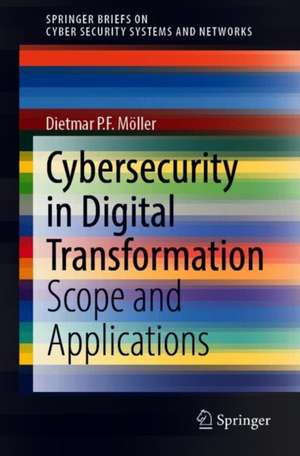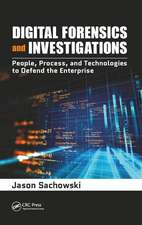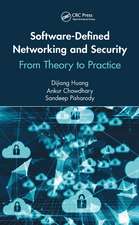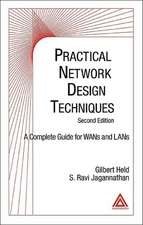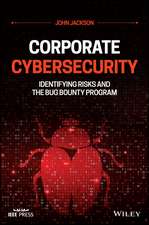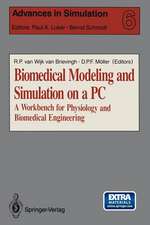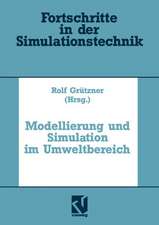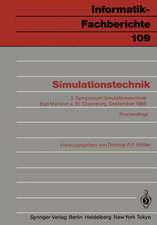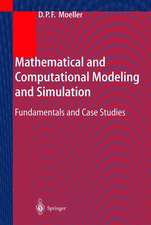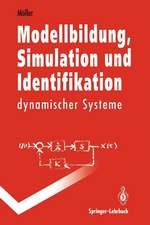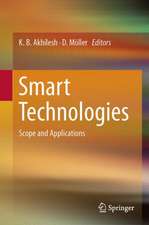Cybersecurity in Digital Transformation: Scope and Applications: SpringerBriefs on Cyber Security Systems and Networks
Autor Dietmar P. F. Mölleren Limba Engleză Paperback – 4 dec 2020
The idea behind digital transformation is to use digital technologies not only to replicate an existing process in a digital form, but to use digital technology to transform that process into something intelligent (where anything is connected with everything at any time and accessible and controlled and designed advanced). Against this background, cyber threat attacks become reality, using advanced digital technologies with their extreme interconnected capability which call for sophisticated cybersecurity protecting digital technologies of digital transformation.
Scientists, advanced-level students and researchers working in computer science, electrical engineering and applied mathematics will find this book useful as a reference guide. Professionals working in the field of big data analytics or digital/intelligent manufacturing will also find this book to be a valuable tool.
Preț: 324.49 lei
Preț vechi: 405.62 lei
-20% Nou
Puncte Express: 487
Preț estimativ în valută:
62.09€ • 64.83$ • 51.39£
62.09€ • 64.83$ • 51.39£
Carte tipărită la comandă
Livrare economică 05-19 aprilie
Preluare comenzi: 021 569.72.76
Specificații
ISBN-13: 9783030605698
ISBN-10: 3030605698
Pagini: 114
Ilustrații: XIX, 114 p. 22 illus.
Dimensiuni: 155 x 235 mm
Greutate: 0.2 kg
Ediția:1st ed. 2020
Editura: Springer International Publishing
Colecția Springer
Seria SpringerBriefs on Cyber Security Systems and Networks
Locul publicării:Cham, Switzerland
ISBN-10: 3030605698
Pagini: 114
Ilustrații: XIX, 114 p. 22 illus.
Dimensiuni: 155 x 235 mm
Greutate: 0.2 kg
Ediția:1st ed. 2020
Editura: Springer International Publishing
Colecția Springer
Seria SpringerBriefs on Cyber Security Systems and Networks
Locul publicării:Cham, Switzerland
Cuprins
1.Cybersecurity in Digital Transformation.- 2.Introduction to Cybersecurity.- 3.Threat Intelligence.- 4.Intrusion Detection and Prevention.- 5.Machine Learning and Deep Learning.- 6.Attach Models and Scenarios.- 7.Cybersecurity Ontology.- 8.Cybersecurity Leadership.
Notă biografică
Prof. Dr. Dietmar P. F. Möller is a Professor in computer engineering. In this position he worked together with industry in different projects and lead EU-US Joint Consortia for Cooperation in Higher Education and Vocational Education and Training. He received grants from the German Research Foundation (DFG) and from the German Federal Ministry of Education and Research (BMBF) for a centre of excellene in Aviation together with partners from industry and universities. In 2016 he received a grant from DAAD and UGC for an Indo German Research and Education project on Cyber-Physical Systems and Cybersecurity, and in 2020 a project founded by MIIT in intelligent manufacturing. In 2016 he published the book “Guide to Computing Fundamentals in Cyber-Physical Systems – Concepts, Design Methods, and Applications”, by Springer Publ. This book has also been translated into Chinese language by Springer Publ. in 2018. In 2019 the book “Guide to Automotive Connectivity and Cybersecurity – Trends, Technologies, Innovations, and Applications” was also published by Springer Publ., and in the same year the book “Smart Technologies – Scopes and Applications” was published by Springer Publ., too. Prof. Dr. Möller has published in total 12 books, more than 200 papers, more than 20 contributions in book chapters, and has given more than 150 presentations at international and national conferences. Prof, Dr. Möller has also received several awards for his scientific research work.
Textul de pe ultima copertă
This book brings together the essential methodologies required to understand the advancement of digital technologies into digital transformation, as well as to protect them against cyber threat vulnerabilities (in this context cybersecurity attack ontology is included, modeling different types of adversary knowledge). It covers such essential methodologies as CIA Triad, Security Risk, Likelihood, and Consequence Level, Threat Attack Profiling, Threat Intelligence, Threat Lifecycle and more.
The idea behind digital transformation is to use digital technologies not only to replicate an existing process in a digital form, but to use digital technology to transform that process into something intelligent (where anything is connected with everything at any time and accessible and controlled and designed advanced). Against this background, cyber threat attacks become reality, using advanced digital technologies with their extreme interconnected capabilitywhich call for sophisticated cybersecurity protecting digital technologies of digital transformation.
Scientists, advanced-level students and researchers working in computer science, electrical engineering and applied mathematics will find this book useful as a reference guide. Professionals working in the field of big data analytics or digital/intelligent manufacturing will also find this book to be a valuable tool.
